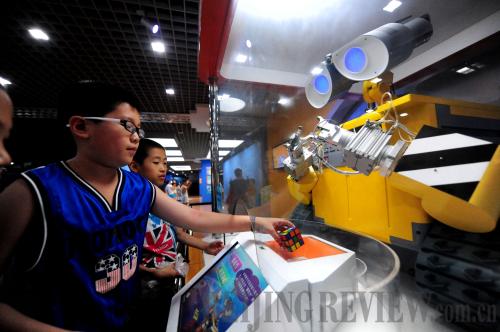|
 |
|
GETTING TECHNICAL: A boy competes with a robot to solve a Rubik's Cube during a science summer camp at the Shenyang Science Centrum in northeast China's Liaoning Province on July 22 (ZHANG WENKUI) |
Even in less developed rural areas, despite meager household incomes, parents are sending their kids to training schools to help them become more well-rounded.
Zheng Shuangyun, an 8-year-old girl living in a village near Laiwu, in Shandong Province, is attending a one-month Latin dance course and a 15-day drawing class offered by two training schools this summer.
Though the courses are barely affordable for her family, with two kids and a monthly income of just 3,000 yuan ($485), Zheng's mother said it's worthwhile because mastering a talent may allow her daughter to earn bonus points during the national college entrance exam. These skills could even enable her to attend an art college. What's more, Zheng loves Latin dance and has practiced it for several years.
"It's a shame to have to give it up," her mother said.
Fostering talent
However, for Li Zhengyu, a 9-year-old student at Beijing's Huangchenggen Primary School, attending training courses over the summer is not his will but his mother's choice.
Li's mother takes him to five classes during the weekend—football, Chinese, math, English and public speech, all of which are offered by different training schools.
"I'm only interested in the football course. However, I have to take all the others because my mother wants me to," said Li.
In China, for children of Li's age whose parents both work, figuring out how and where to spend the summer holiday can be a headache. Parents worry about their children's safety when staying home alone, and normally ask grandparents to look after the kids or sign them up for various training programs.
Parents have traditionally enlisted their children in Chinese, English and math courses to help them achieve better academic performance at school. However, for many Chinese parents with increasingly high expectations for their kids, outstanding grades are no longer enough; drawing classes, piano lessons, or dance are becoming necessary pursuits. As a consequence, many kids' summer vacations are not so different from a school semester.
Chinese parents are afraid that their children will fall behind if they don't take as many summer classes as their peers, said Fan Hesheng, a professor of sociology at Anhui University.
Fan said parents shouldn't expect their kids to be good at everything. Instead, they should choose to enroll their kids in the courses in which they show interest.
Wang, the junior middle school girl who voluntarily attended New Oriental summer courses, said she learned a lot during the nine days' training.
"We had both Chinese and foreign teachers who were very enthusiastic about teaching. Now I'm able to communicate with foreigners in English," Wang said.
Additionally, Wang made friends with classmates from other provinces. "It was an exciting experience for me."
Xiong Bingqi, Deputy Director of the Beijing-based 21st Century Education Research Institute, said children should be allowed to plan their own summer vacations. Courses forced onto kids may fail to achieve the expected result. Instead, parents should respect their children's interests and give them some freedom, providing guidance only when their children can't work out a proper plan themselves.
At the beginning of his vacation, Li had wanted to join a summer camp that involved activities like riding camels and horses, but was not allowed to attend due to his young age.
When asked what he would do if he were to plan his own summer vacation, the 9-year-old independent-minded boy told Beijing Review: "I just want to play video games and travel abroad without the company of my parents. I want more freedom."
Email us at: jijing@bjreview.com | 